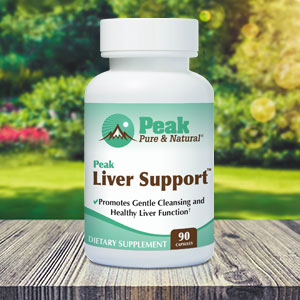Get Easy Health Digest™ in your inbox and don’t miss a thing when you subscribe today. Plus, get the free bonus report, Mother Nature’s Tips, Tricks and Remedies for Cholesterol, Blood Pressure & Blood Sugar as my way of saying welcome to the community!
When dementia starts with your liver

When is dementia, not dementia? When it’s liver disease… and when, unlike dementia, it may be treatable.
Hepatic encephalopathy (HE) is a treatable condition brought on by long-term liver damage. But it’s hard to diagnose…
That’s because HE is usually preceded by cirrhosis, where the liver is damaged and scarred. Cirrhosis is considered a silent disease and is usually not detected until its later stages — making the resulting disease, HE, even harder to diagnose.
Hopefully, healthcare providers and patients can work together at diagnosing these conditions — now that we’re learning as much as 13 percent of people diagnosed with dementia may instead have an underlying silent liver disease causing or contributing to their symptoms…
Hepatic encephalopathy: A life-changing misdiagnosis
Researchers examined medical records of 175,000 former patients treated by the Veterans Health Administration over ten years — specifically choosing those who had been diagnosed with dementia on at least two separate occasions.
Using clinical data, they calculated a FIB-4 score (a score based on liver blood results and age that can be used to predict liver damage). Ten percent had a FIB-4 score higher than 3.25 (the cut-off for diagnosing liver scarring).
High scores were more common in patients with risk factors for liver disease, like viral hepatitis and heavy drinking — and less common in patients with risk factors commonly associated with dementia, like diabetes, hypertension and kidney disease.
Next, the researchers confirmed their findings by looking at a separate group of people assessed for dementia at their hospital. They found similar results, with 9 percent having a high FIB-4 score and potential cirrhosis.
This suggested that around 10 percent of people diagnosed with dementia may instead have underlying silent liver disease with HE causing or contributing to the symptoms.
But that number keeps going up…
In a recent follow-up study, Virginia Commonwealth University researchers repeated this review with 68,807 medical records of patients from a national database who weren’t veterans.
They were surprised to find that even more patients with high FIB-4 scores were found in this population — almost 13 percent.
“This important link between dementia and liver health emphasizes the importance of screening patients for potentially treatable contributors to cognitive decline,” concluded Virginia Commonwealth University hepatologist Jasmohan Bajaj.
HE symptoms and similarities to dementia
Nonalcoholic fatty liver disease (NAFLD) is becoming increasingly common and is an early-stage liver disease. But left untreated, it can progress to hepatic encephalopathy.
Initial symptoms of HE can be subtle and seemingly harmless, including changes in sleep patterns or irritability.
But as the condition worsens, symptoms become more apparent: forgetfulness, disorientation or confusion.
It’s easy to see how these symptoms can be mistaken for the cognitive decline that leads to dementia — though the damage caused to the brain has a different origin…
In HE, when a liver scarred by cirrhosis can no longer detoxify the blood, then toxins (mainly ammonia) build up and enter the brain, interfering with brain function.
Dementia, on the other hand, is caused by long-term damage to brain function, usually due to damage to the small blood vessels that supply blood to the brain. Diabetes and vascular dementia are two ways that this can happen.
If a loved one is showing signs of dementia and you have any reason to think they might have a damaged liver, get your physician to check. Ultimately, HE can lead to coma and death in its most severe form.
But diagnosed early enough, HE can be treated, first with laxatives that help to remove ammonia and other toxins that accumulate in the gut. This is followed by treatment with an antibiotic (rifaximin) that kills some of the harmful ammonia-producing bacteria in the gut.
By getting your doctor to run a few tests, you could help a loved one escape a double-whammy: the slow decline into dementia, and a painful death from liver disease.
Editor’s note: Did you know that when you take your body from acid to alkaline you can boost your energy, lose weight, soothe digestion, avoid illness and achieve wellness? Click here to discover The Alkaline Secret to Ultimate Vitality and revive your life today!
Sources:
Many Dementia Cases Could Actually Be a Hidden Form of Liver Disease — Science Alert
Up to 13% of Dementia Cases May Be a Misdiagnosed Treatable Condition — Science Alert
Undiagnosed Cirrhosis and Hepatic Encephalopathy in a National Cohort of Veterans With Dementia — JAMA Network














